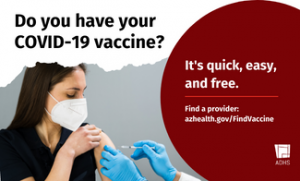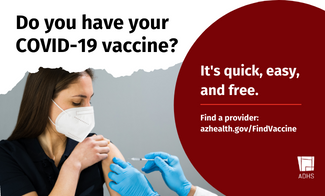 If you haven’t received a COVID-19 vaccine yet, now’s the time to join many other of your fellow Arizonans who are doing so right now. No one will criticize you; there is no shame. In fact, you’ll be welcomed with smiles and open arms!
If you haven’t received a COVID-19 vaccine yet, now’s the time to join many other of your fellow Arizonans who are doing so right now. No one will criticize you; there is no shame. In fact, you’ll be welcomed with smiles and open arms!
You are not alone. The Arizona Department of Health Services reports 63,317 doses of the COVID-19 vaccine were administered in Arizona during the week of March 27. Slightly more than 5 million people in our state (74.9-percent of eligible Arizonans) have received at least one dose since vaccines became available.
Across the United States, that average was 181,000 people a day who were still rolling up their sleeves to receive the COVID-19 vaccine.
So get vaccinated if you aren’t, get boosted if you haven’t. Find a location at azhealth.gov/FindVaccine.
You’ll make us all happy when you walk through the door and you’ll also increase protection for you and your family.
The time is now.
The COVID-19 vaccine, as with the flu vaccine and others, can take a week or two to be fully effective. So if you know you’ve been exposed and then receive the vaccine, there’s still a chance you’ll end up getting sick because the vaccine simply hasn’t had enough time to work.
The best choice is to receive a vaccine before you are exposed.
Of course a major reason to receive the COVID-19 vaccine is to prevent you from becoming ill, or reducing the severity if you do become ill, but it is also important to lower the chances of passing along illnesses to your family, friends and others. If someone is exposed before the vaccine is fully effective, not only can they get infected, but they’re also still at risk of passing it on.
What if I’ve already had COVID-19?
Should you still get the COVID-19 vaccine even if you’ve already had COVID-19?
The answer is “Yes, for sure.”
Here’s why:
When you catch an illness like COVID-19, your body produces antibodies to fight what’s infecting your body. Hopefully if you are exposed to COVID-19 again, these antibodies will be able to recognize the virus and stop them before you get sick from the same illness again.
Not everyone makes antibodies, though, and it’s basically impossible to predict whose bodies will produce them and whose will not.
In fact, data has shown that people who experience COVID-19 with relatively mild symptoms seem to make weaker antibodies. Since they’ve been able to clear the virus so quickly, they don’t make as tough of a defense for when they experience the virus again.
So the idea that having had COVID-19 already means you automatically have great immunity against catching the virus again is not true.
Also, you should still get a COVID-19 vaccine even if you’ve already been infected because antibodies can weaken over time. The longer it’s been since you’ve been infected with COVID-19, the more diminished your immunity will be.
Plus there are different variants of COVID-19.
Just because you may have had the original variation of COVID-19, does not mean that gives you the same protection against the different variants. In fact, data suggests that the vaccines are better at protecting against multiple variants.
So if you’ve had COVID-19 already, antibodies might help, but there is no assurance that’ll be the case. If you get vaccinated after you’ve already had COVID-19, you’ll have a stronger immune system response.
Many have been vaccinated.
Since the U.S. COVID-19 Vaccination Program began in mid-December 2020,over 563 million vaccine doses have been administered in the United States. Overall, about 255 million people, or 77.1% of the total U.S. population, have received at least one dose of vaccine. About 218 million people, or 65.7% of the total U.S. population, have been fully vaccinated. About 98.3 million additional or booster doses have been reported in people who have been fully vaccinated.










